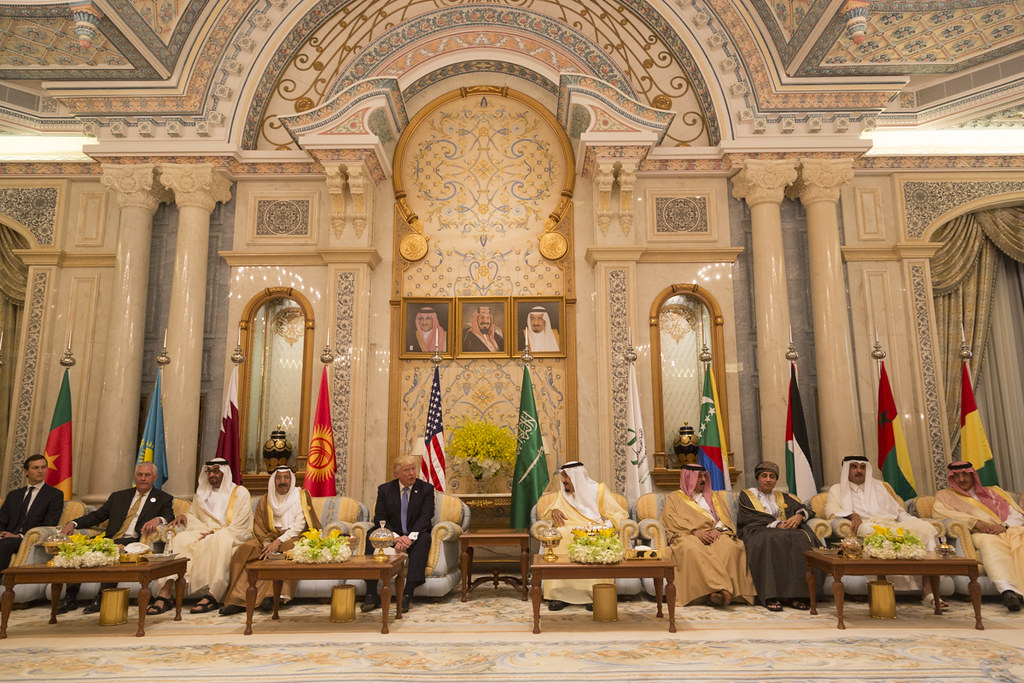Forecasting the Continuation of Pragmatic, Interest-Based Foreign Policies by Gulf States Following Trump’s Re-election
Ahn Soyeon (SNUAC)
As former President Donald Trump potentially returns to office following the U.S. presidential election, attention is turning to possible shifts in U.S. Middle East policy. Gulf states, traditionally close allies of the U.S., appear to welcome Trump’s return to power. However, there are simultaneous concerns that his administration’s second term might pursue a Middle East policy distinct from that of his first, reflecting changes in the global order.
During Trump’s first term, his administration cultivated personal ties with Gulf leaders, expanded arms deals, and fostered amicable relations. At the same time, it largely avoided interfering in internal issues such as human rights within the Gulf states. Demonstrating these ties, Saudi Crown Prince Mohammed bin Salman promptly congratulated Trump upon his initial election victory.
However, a second Trump administration may have to navigate new Middle Eastern policies amid complex global crises such as the Ukraine war and the ongoing Israel-Hamas conflict. Furthermore, Gulf states’ diplomatic strategies have undergone significant changes compared to Trump’s first term. During that period, the Gulf nations focused on isolating Qatar and exerting pressure on Iran. In contrast, under the Biden administration, they have adopted a more conciliatory approach, exemplified by the Saudi-Iran normalization agreement.
Despite these regional shifts, Trump is expected to escalate pressure on Iran, which could further strain U.S.-Iran relations and heighten political instability in the Gulf. Concerns have also been raised about potential disagreements between the Gulf states and a second Trump administration regarding efforts to resolve conflicts in Gaza and Lebanon amid deteriorating Arab public sentiment. For instance, while Saudi Arabia and the UAE have expressed support for a two-state solution, Crown Prince Mohammed bin Salman has recently intensified criticism of Israel, labeling its actions in Gaza as “genocide.” These developments suggest possible discord between Gulf nations and a Trump administration over Israel-related issues.
Nevertheless, Trump is likely to continue efforts to normalize relations between Israel and Arab states, including Saudi Arabia. This raises questions about the negotiation strategies Gulf states might employ during these discussions.
Meanwhile, Gulf nations have maintained friendly ties with emerging global powers like China and Russia amid the U.S.’s gradual pivot away from the Middle East. They are expected to prioritize their national interests under a second Trump administration, balancing relations with the U.S. while pursuing pragmatic benefits through diversified diplomacy with China, Russia, and other international players.
트럼프 재집권 이후에도 걸프 국가들 실리 위주 외교 지속할 것으로 전망
안소연 (아시아연구소)
미 대선 결과 트럼프 전 대통령이 재집권하게 됨에 따라 이에 따른 미 정부의 대중동 정책 변화에 관심이 쏠리고 있다. 먼저 미국의 전통 우방 국가인 걸프 국가들은 트럼프의 재집권을 환영하는 분위기이다. 하지만 변화된 국제 질서 속에서 트럼프 1기와는 다른 대중동 정책이 추진될 수 있다는데 우려를 동시에 가지고 있는 것으로 보인다. 트럼프 집권 1기에서는 트럼프 행정부는 걸프 국가들의 지도자들과 개인적 유대관계를 쌓고, 무기 거래를 확대하면서 우호적인 관계를 쌓아왔다. 동시에 걸프 국가들의 인권 문제와 같은 내부 문제에는 간섭하지 않는 경향을 보여주었다. 이러한 친분을 보여주듯 트럼프가 당선되자마자 사우디아라비아 무함마드 빈 살만은 곧바로 트럼프 당선인에게 축하 인사를 전했다.
하지만 트럼프 집권 2기 시기에는 우크라이나 전쟁, 이스라엘-하마스 전쟁과 같은 복합적인 국제 위기 속에서 새로운 대중동 정책이 펼쳐질 가능성도 배제할 수 없다. 이와 함께 걸프 국가들의 외교 전략도 트럼프 집권 1기와 비교해 상당 부분 변화하였다. 카타르 단교, 이란에 대한 압박이 걸프 국가들의 외교 정책의 주요 기조였던 것과 달리 걸프 국가들은 유화된 방식으로 외교 전략을 구축하려는 모습을 바이든 정부 집권 기간 동안 보여주었다. 사우디-이란 간 관계 정상화 합의가 대표적인 사례라고 평가할 수 있다.
이러한 미묘한 걸프 지역의 역내 분위기의 변화와 달리 트럼프 당선인은 이란에 대한 압박 수위를 강화할 것으로 전망된다. 이에 따른 미국과 이란의 관계 악화가 걸프 지역 정치 불안정을 고조시킬 수 있다는 우려도 제기되는 상황이다. 또한, 악화되는 아랍 대중의 민심 속에서가자 및 레바논의 전쟁 상황을 마무리 짓는 사안에 있어서도 걸프 국가들과 트럼프 정부 간의 이견도 예상된다. 전반적으로 사우디, UAE 등은 두국가 해법에 동의하고 있는 상황이며 최근 사우디 무함마드 빈 살만 왕세자는 가자 지구에 대한 이스라엘의 행위를 대량학살이라고 발언의 수위를 높이고 있다. 따라서, 이스라엘과 관계에 있어서 걸프 국가들과 트럼프 행정부 간의 이견 가능성도 배제할 수 없다. 이와 동시에 트럼프 행정부는 사우디를 비롯한 아랍 국가들과 이스라엘과의 관계 정상화를 추진할 것으로 보이며 이 과정 속에서 걸프 국가들이 어떠한 협상 카드를 내세울지도 귀추가 주목된다.
한편, 그동안 걸프 국가들은 미국의 탈중동 정책 추진 속에서 중국, 러시아와 같은 국제사회에서 새롭게 부상한 국가들과도 우호 관계를 유지해왔다. 걸프 국가들은 트럼프 집권 2기에서도 자신의 국익 추구를 최우선 과제로 두고 트럼프 정부와의 관계 유지 속 중국, 러시아 등과 외교 관계를 통해 실용적 이익을 추구하면서 외교 다변화를 지속해서 꾀할 것으로 전망된다.

